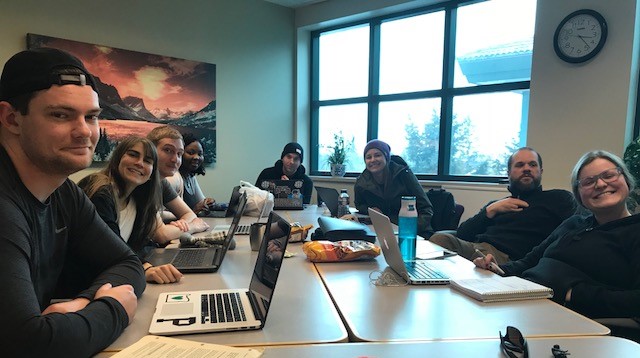Highlights of Program Coursework & Projects
While core classes provide the essential foundations for an analytics degree, electives allowed students to tailor the program to meet their own career goals. All students graduate with the ability to communicate in both a business and technical setting, harnessing the power of data to make better decisions.
Professor John Chandler’s Applied Data Analytics course is the most technical in the core curriculum, as students are introduced to programs Python, R, and SQL. From working through intense data cleaning tasks in Python to unique statistical analysis in R, the course provides the foundation for a wide variety of analysis of structured and unstructured data. A highlight of the course was completing an individual project using text data. For example, Ethan Arave scraped thousands of book titles from a bookstore online and used them to build a model that trained itself on existing book titles and generated new titles based on what it learned. These projects were a way to practice unique analytic technique while focusing on a topic of interest.
Another program highlight was the marketing research projects completed in Simona Stan’s Advanced Marketing Research class. In groups of four, students partnered with local businesses to design and distribute a questionnaire to gain insight into key issues. A survey designed for Missoula’s Planned Parenthood (PP) had over 400 responses and results were used to determine how key demographics related to the use of PP services.

Working with local theater The Roxy, another team gathered over 500 customer responses and helped the Roxy determine key target segments and effective marketing channels. Working with local businesses allowed students to give back to the community while getting experience with the marketing research process from start to finish.
Many individuals in the 2018 cohort chose a technically focused elective curriculum and took classes such as Practical Big Data Analytics (from the Math Department) and Machine Learning (from the Computer Science Department).
In Machine Learning, students explored algorithms, neural networks, and complex models. Tackling these subjects required an “all hands on deck” mentality, and students collaborated to succeed in the course. The semester concluded with presentations showing how machine learning could be used to create a video with simulated faces of celebrities, identify cancer risk earlier, and improve marketing software. While the technical classes such as Machine Learning presented a challenge, they offered essential tools for the analysis of big data and opened the door to technically focused data science positions upon completion of the program.
Two students interested in the intersection of journalism and data analytics took Investigations, an upper-level Journalism course focused on the methods and ethics involved in investigative reporting. The use of quantitative analysis in journalism adds a level of credibility to the writing and typical qualitative research. The pair worked on a project examining opioid addiction of pregnant women in Montana and contributed useful analytics to the final report.
Several students participated in independent studies courses to hone in on specific topics of interest such a neural networks and attribution modeling. In an independent study with the Rocky Mountain Research Station, Jason Weiner used spatial analysis techniques to assess how well a model was predicting the density of dead trees across the western US. Model predictions were quite accurate in most of the area, however, the model underpredicted snag density in areas recently affected by insects and wildfires. Jason then assisted with gathering information on variables that could be added to the model to increase prediction accuracy in disturbed areas.

“The snag density maps are currently being used on some active wildfire incidents to help let firefighters know where hazards might exist. Jason's work is helping us to better predict hazards in the next generation of our model.”
Karin Riley, Research Ecologist at Rocky Mountain Research Station
At the end of the Spring semester, the MSBA students were asked to mentor for Professor Jason Triche’s junior-level Intro to Data Analytics class. Several students had taken the Intro class as a program prerequisite as recently as the previous summer; assisting with group projects and answering student questions showed the mentors how far they had come over the course of the year with their knowledge and technical abilities. Individuals in the Intro class planning on entering the MSBA program in the fall were able to get advice and encouragement from the soon-to-be graduates.
To learn more about the program design, explore the course curriculum!
